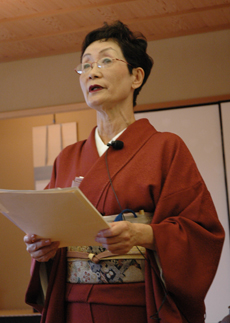Japan House celebrates seven years of tranquility
October 24, 2005
With more than 50 University students, officials, alumni and community members in attendance, the Japan House commemorated its 7th annual open house Saturday with guest speaker Dr. Lee Gurga and traditional tea ceremonies.
The building, located at 2000 S. Lincoln Ave. in Urbana, is mainly a classroom for teaching Japanese art and culture to University students, but it is open to the community as well.
“People come (to the Japan House) for a peace of mind, so it is not just a place where we teach Japanese art and culture,” said Kimiko Gunji, director of Japan House and University professor.
Japan House offers three classes per week as well as tea ceremonies, which are open to the public, according to a newsletter distributed during the open house.
Lissa May Mudrick, assistant director of Japan House, said the building began in 1976 when University professor emeritus Shozo Sato was teaching Asian courses out of his old Victorian home called the Japan House.
Get The Daily Illini in your inbox!
“They did that until 1998 when they had to tear that home down, and we received contributions to build the new Japan House,” Mudrick said. “It was constructed with contributions from Japan and local contributors who wanted to support the teaching of Asian culture to University students.”
Gunji said the interest for Japanese art and culture by University students and community people made the new Japan House possible.
“We had so many students and community people interested that we started to think about building a new house,” Gunji said.
Dr. Lee Gurga, editor of Modern Haiku magazine and the event’s honorary guest speaker, spoke about haikus in his lecture, “Haiku East, Haiku West.” Gurga has been writing and speaking about haikus for 35 years.
“Haiku is right now recognized as the most popular form of poetry in the world,” Gurga said. “On the one hand, there is this wonderful accessibility, and the other hand, it is capable of the most profound depths of expression. It is the kind of poetry with the biggest range as far as accomplishments and where it can take you. There is no person in this room who doesn’t think that they could write a haiku.”
Jessica Hilliard, sophomore in Engineering and member of a tea group, said she frequents the Japan House.
“(It offers) an authentic Japanese experience where you can learn about its culture,” Hilliard said. “I like coming here because it is very tranquil and peaceful and it is a nice break from school.”
Blake Harvey, graduate student, said he enjoys the human quality of Japan House.
“There is something about it that is very human and personal,” Harvey said. “I think a lot of the other classes at the University focuses more about teaching the material … here, I really feel you get to interact with the professors and the other students and learn more about yourself and others.”
Mai Takeuchi, student at Parkland College and volunteer at Japan House, said she loves the Japan House because the way professor Gunji teaches is amazing, and the opportunity to get a professional tea ceremony lecture is great since there are not too many of them in the United States.
“The atmosphere is really nice, really quiet, the scenery is very beautiful,” said Denise Chang, sophomore in Business and member of the tea group. “The area is more open and less busy than the rest of campus. Students can come and get tea ceremonies done, or they can walk in the garden.”
Christy Foster, freshman in LAS, said that everyone at Japan House is very inviting and the environment is very hospitable.
“It is something that more people should know about and come visit,” Foster said.
She referred to the Japan House as a healing experience, “making me feel very happy and peaceful.”
“You walk in here and the atmosphere makes you calm and your classes don’t matter,” said Ellen Dennis, freshman in LAS. “You can’t get that anywhere else.”
Others agreed.
“I love the setting,” Mudrick said. “I love that it is two blocks from campus but looks like you are in a private park. I think every student should come out here and visit and have a chance to enjoy this serenity.”
Dennis said it is important to get to see the different cultures of the world, especially being an American.
“We have so many other cultures here so why not get to know them and understand them a little bit better,” Dennis said.







